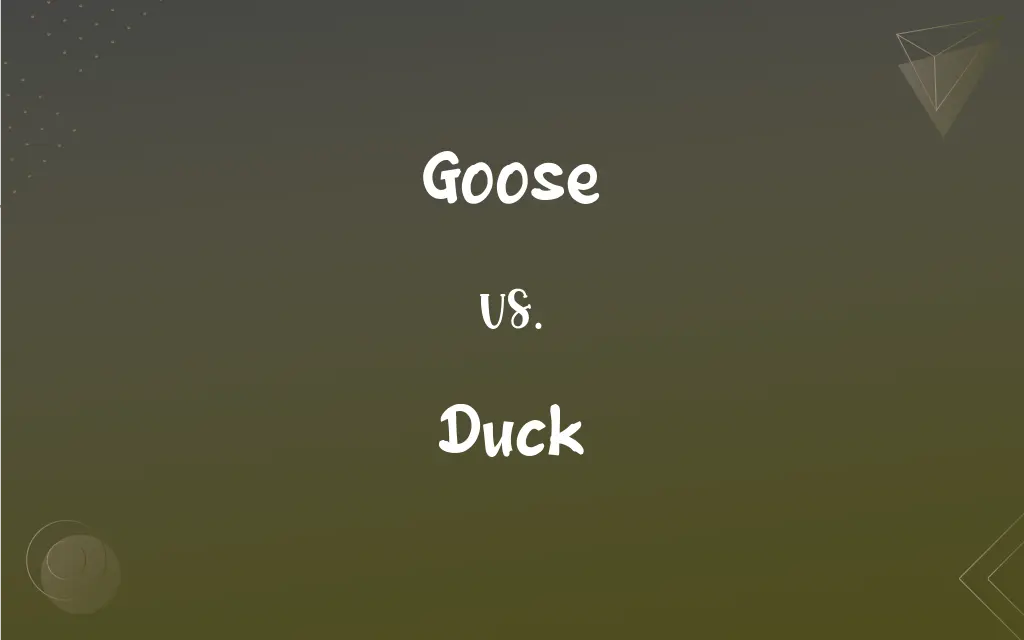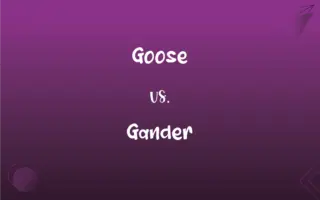Goose vs. Duck: What's the Difference?
Edited by Aimie Carlson || By Harlon Moss || Updated on October 6, 2023
A goose is a large waterfowl with a long neck, while a duck is a smaller waterfowl with a shorter neck and broad bill.

Key Differences
Both geese and ducks belong to the Anatidae family, sharing some characteristics due to their waterfowl nature. However, there are prominent differences that set them apart. A goose, by definition, is a larger bird and often has a longer neck and more tapered bill. Ducks, in comparison, are generally smaller and possess a more compact body with a broader bill suitable for sifting through water for food.
When observing their behavior and habitat preferences, there's a noticeable difference between geese and ducks. Geese are more migratory than most duck species, often traveling long distances during different seasons. Ducks, on the other hand, may migrate, but many species are also known to remain in a single region throughout the year.
Their vocalizations are distinctly different. The goose is known for its honking sound, which can be heard during migration. Ducks are recognized for their quacking, although different species of ducks have varied vocalizations. Additionally, geese tend to be more terrestrial, often seen grazing on land, while ducks spend a more significant amount of time in water.
Lastly, in terms of domestication, both geese and ducks have been domesticated for various purposes, including meat, eggs, and ornamental reasons. While domestic ducks are commonly raised for their meat and eggs, geese are often reared for meat and occasionally for their down feathers, which are used in bedding and clothing.
Comparison Chart
Size
Generally larger
Smaller and more compact
Neck Length
Longer neck
Shorter neck
Bill Shape
More tapered
Broader and flatter
Vocalization
Honking
Quacking
Behavior
More migratory, grazes on land
Spends more time in water, some are sedentary
Goose and Duck Definitions
Goose
A bird known for its honking vocalizations.
The sound of the goose's honk echoed across the lake.
Duck
A waterfowl with a short neck and broad bill.
The duck floated peacefully on the pond.
Goose
A large waterfowl known for its long neck.
The goose flew over the pond gracefully.
Duck
A bird adept at swimming and diving for food.
The duck dived underwater to catch its meal.
Goose
A migratory bird often traveling in V-shaped formations.
We watched the geese migrating south for the winter.
Duck
Commonly domesticated for meat and eggs.
Farmers often raise ducks for fresh eggs.
Goose
A bird reared for its meat and down feathers.
The farmer raised a flock of geese for their down.
Duck
Known for its distinctive quacking sound.
I could hear the duck's quack from afar.
Goose
A member of the Anatidae family closely related to swans.
The goose, like the swan, has a majestic presence on the water.
Duck
A member of the Anatidae family with various species worldwide.
The mallard is a commonly recognized species of duck.
Goose
The flesh of such a bird used as food.
Duck
Any of various wild or domesticated waterbirds of the family Anatidae, characteristically having a broad flat bill, short legs, and webbed feet.
Goose
Any of various wild or domesticated waterbirds of the family Anatidae, and especially of the genera Anser, Branta, and Chen, characteristically having a shorter neck than that of a swan and a shorter, more pointed bill than that of a duck.
Duck
A female duck.
Goose
The female of such a bird.
Duck
The flesh of a duck used as food.
FAQs
Are geese more migratory than ducks?
Yes, geese often travel long distances during migrations.
What sound does a duck make?
A duck is known for its quacking sound.
Are both goose and duck waterfowl?
Yes, both belong to the Anatidae family.
Are all ducks good at diving?
Many ducks dive for food, but not all species are adept divers.
What is a common use of goose down?
Goose down is commonly used in bedding and clothing.
Which has a longer neck, a goose or duck?
A goose typically has a longer neck.
Are there more species of ducks than geese?
Yes, there are many species of ducks compared to geese.
Which is generally larger, a goose or duck?
A goose is typically larger.
Can you eat both goose and duck meat?
Yes, both are consumed worldwide.
Why do geese migrate?
Geese migrate in search of food and suitable breeding grounds.
Do geese graze on land?
Yes, geese often graze on land for food.
How do goose and duck feathers differ?
Goose feathers are often larger and fluffier, especially the down.
Do geese mate for life?
Many species of geese are monogamous and mate for life.
Can ducks fly long distances?
Some duck species are migratory and can fly long distances.
Are geese and ducks herbivores?
Both can be omnivorous, consuming plants and small aquatic animals.
Do geese fly in a specific formation?
Yes, they often fly in a V-shaped formation.
What's the primary habitat of a duck?
Ducks predominantly inhabit freshwater bodies.
Are all ducks quack loud?
Not all ducks quack loudly; vocalizations vary among species.
Are ducks colorful?
Some duck species, especially males, display vibrant colors.
Are ducks domesticated as pets?
Some people keep ducks as pets, but they're commonly raised for meat and eggs.
About Author
Written by
Harlon MossHarlon is a seasoned quality moderator and accomplished content writer for Difference Wiki. An alumnus of the prestigious University of California, he earned his degree in Computer Science. Leveraging his academic background, Harlon brings a meticulous and informed perspective to his work, ensuring content accuracy and excellence.
Edited by
Aimie CarlsonAimie Carlson, holding a master's degree in English literature, is a fervent English language enthusiast. She lends her writing talents to Difference Wiki, a prominent website that specializes in comparisons, offering readers insightful analyses that both captivate and inform.































































